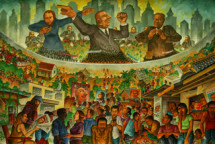Ideas into movement
Boost TNI's work
50 years. Hundreds of social struggles. Countless ideas turned into movement.
Support us as we celebrate our 50th anniversary in 2024.

How are populations of diverse social and ethnic origins involved in recent processes of biophysical resource grabbing in Venezuela?

Conflicts over the control of land and natural resources have been a historical constant in Latin America. At the beginning of the 21st century a new set of territorial transformation processes bordering the Orinoco river basin and its neighbouring Amazonian plains are taking place, as a result of the public policies implemented by the Venezuelan state, with negative impacts both on biodiversity and on the human populations of different ethnic origins inhabiting these territories. These new dynamics have rekindled old and open new territorial and ethnic conflicts. The main objective of the paper is to develop a theoretical and research agenda focusing on the analysis of the more recent processes of grabbing of biophysical resources (focusing on oil and minerals) in which populations of diverse social and ethnic origins are involved.
Venezuela is mired in a complex economic and humanitarian crisis dominated by a galloping three-digit inflation, severe problems of food shortages, medicines and other goods, and a strong recession. The main cause of inflation that Venezuelans live is well known. The increase in public spending that was highly wasteful, in addition to discretionary and opaque, generated a significant fiscal deficit that has not been covered by taxes or debt, regardless of whether we have become seriously indebted during these years.
The main mechanism to cover the deficit has been the monetary issue because the indebtedness already has a very high cost and at this moment the financial systems for this purpose are blocked. The Venezuelan government maintains that the economic crisis is the consequence of an "economic war" promoted by the opposition and the business sectors. By contrast, analysts point out that the complex situation is a product, to a large degree, of the exhaustion of price control systems and changes in force since 2003. As there has been a dismantling of productive chains and a drop in national production, there are fewer and fewer goods and more liquidity in the market. That has been generating a kind of vicious circle that accelerates the speed of inflation, this imbalance between supply and demand money is what generates this inflationary situation.
The politics of ethnic difference of the current government are not different from those of the former neoliberal governments to divide indigenous peoples and perpetrate ‘accumulation by disposession’, occupying spaces of life for territorialities destined for extractivism. Promised development and inclusion usurp indigenous symbols and agendas, their autonomous ways of life within the framework of greater integration into national markets of commerce, consumption and labour.
This paper was presented at the Emancipatory Rural Politics Initiative (ERPI) 2018 Conference: "Authoritarian Populism and the Rural World"